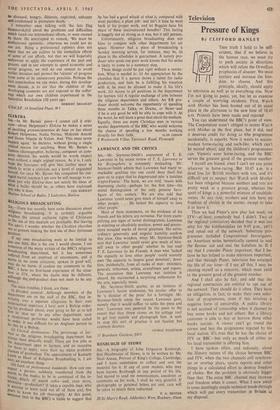Television
Pressure of Kings
By CLIFFORD HANLEY
Tins truth I hold to be self- evident, that if we believe in the human race, we must try
to push society in directions which will refute the Orwellian
prophecies of disaster. We must nurture and increase the free- dom to choose. And this
principle, ideally, should apply to television as well as to everything else. Now I'm not going to panic, yet, but let us examine a couple of worrying incidents. First, Watch with Mother has been booted out of its usual place in the afternoon to the new time of 10.45 a.m. Protests have been made and rejected.
You can understand the BBC's point of view. The Corporation wasn't obliged to invent Watch
with Mother in the first place, but it did, and it deserves credit for doing so (the programme incidentally, is superb). Now it wants to accom- modate horse-racing and such-like, which can't
be moved about, and the children's programmes can. Viewers want horse-racing, and the BBC
serves the greatest good of the greatest number.
I myself am biased, since I can't see any point whatever in horse-racing. But 10.45 a.m. is a dead loss for British mothers with tots, and it's difficult not to suspect that Watch with Mother has been relegated because mothers and tots are pretty weak as a pressure group, whereas the sport of kings is a powerful mixture of establish- ments. At any rate, mothers and tots have no freedom of choice in the matter, except to take it or leave it.
Then we had Pinter's new play last week, on ITV—at least, somebody had. I didn't. Two of the regional contractors decided that it was too sexy for the kiddiewiddies (at 9.45 p.m., yet!) and opted out of the network. Substitute pro- grammes included Congressional Investigator,
an American series hermetically canned to seal the flavour out and seal the botulism in. If I
say that I consider Pinter important, that I be-
lieve be has helped to make television important, and that through Pinter, television has enlarged the life of our time--if I say all this, I may be classing myself as a minority, which must yield to the greatest good of the greatest number.
And I shall also be fair, and add that the regional contractors are entitled to opt out of the network. They should do it often. They have an obligation, in fact, to make their own selec- tion of programmes, even if this involves a negative form of censorship. A public library is not accused of censorship when it chooses to buy some books and not others. But a library
customer is able to buy or borrow those other books outside. A viewer can't go round the
corner and buy the programme rejected by his local station. It's true that he has the choice of ITV or BBC—but only as much of either as his local transmitter is offering him.
I have spoken often, and tediously, about the illusory nature of the choice between BBC
and ITV, when the two channels still synchron- ise or overlap plays, sports reports and other things in a calculated effort to destroy freedom of choice. But the problem is obviously bigger than that. The extra BBC channel may increase real freedom when it comes. What I now await is some dazzlingly simple technical break-through which will put every transmitter in Britain at my disposal.


































 Previous page
Previous page